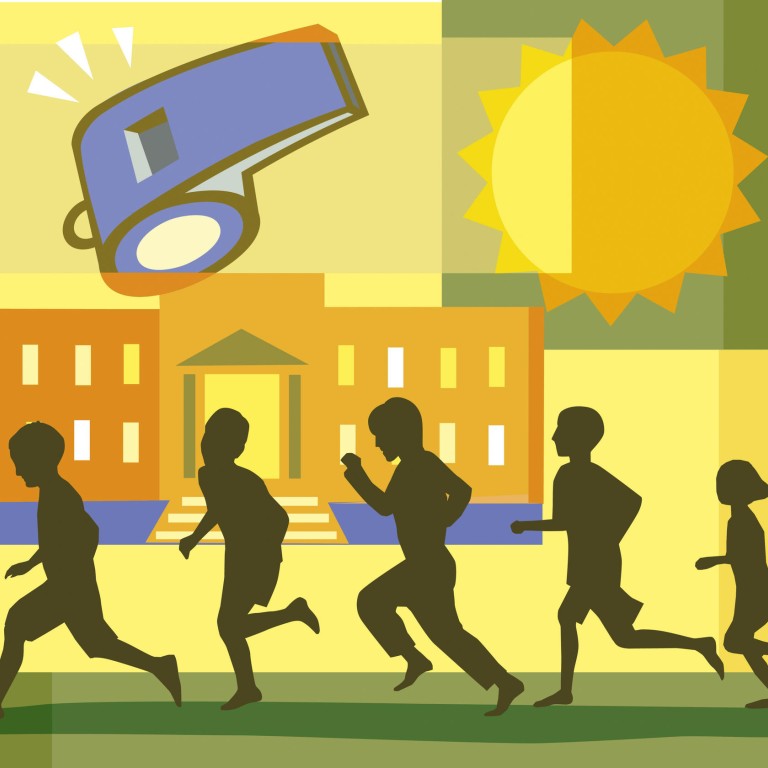
PE can help set a child up for a healthy future
PE lessons that are not run by experienced and sensitive professional teachers can be humiliating and even miserable for children who feel they are no good at sport. With the addition of hormones and developing bodies some children will do anything to avoid PE, so your daughter is not alone in her feelings.
However, physical exercise is a crucial part of the curriculum, being essential for overall healthy development. It is well researched that active children are likely to experience better physical and mental health and often have more self-confidence and a positive attitude to life.
Try to help your daughter realise the importance of exercise and keeping fit, and that building up an innate fitness in childhood will carry her through life and reduce the risk of illness and disease as she gets older.
Make sure your daughter has loose-fitting clothes for PE so she doesn't feel so exposed.
Many older students outgrow their uniforms and pubescent girls in particular start to look very uncomfortable in tight T-shirts and short shorts. Parents can be understandably reluctant to replace clothing at this point as their children are soon moving on to secondary school but it will be a worthwhile investment.
Children all have different strengths and they need to work at the subjects they find challenging with the encouragement of parents and teachers. A maths lesson can be miserable for someone who is poor with numbers, but with support children can develop a positive attitude and work at their own pace.
Confidence in any area only increases with practise and perseverance. Your daughter needs to understand that it is her attitude and effort that are important in PE lessons. Highlight her strengths in other areas and explain that we can't perform to a high level at everything.
Children who learn and practise fundamental movement skills build body confidence and improve posture, balance and core strength.
The key is to find something that your daughter enjoys to help her to be active, both in and out of school. Try to be good role models yourselves, exercising regularly and eating a healthy diet and do active things together as a family. This will increase her level of fitness which may in turn give her the confidence to take a more active part in PE lessons.
PE teachers these days are often creative and offer a wide range of physical activities for children to enjoy along with the traditional sports. Secondary schools tend to have more facilities for less mainstream sports like rock climbing or table tennis, and your daughter may have more options when she moves on next year.
It would be worthwhile making the PE teacher aware of this sensitive situation so your daughter can be given extra encouragement and praise for small achievements whenever possible.
Also, try to ascertain whether she has been teased by her peers for poor coordination or if she feels she is always the last to be picked for a team. This may strongly affect the way she feels about the lessons.
It is natural that friendships develop around common interests and sport can be very important in the formation of social groups, especially if, in this case, the school netball team is successful. Competing and winning can be a very bonding and adrenaline-driven experience. Hopefully these groups do not become too exclusive in school.
There will be other students who prefer to do different activities at playtimes and who have a variety of interests and hobbies. Try to encourage these friendships.
Unfortunately, the world is becoming more inactive than ever due to increased screen time and fewer manual jobs, hence weight gain and lack of fitness have become commonplace.
There is research that says children should be doing at least an hour of physical activity every day - most do not achieve this. Many students in Hong Kong are driven to school and opportunities for exercise outside school can be limited to expensive extracurricular activities which are often taken up by sports enthusiasts anyway.
Avoiding physical education is not an option. Make sure you check your daughter's timetable to ensure she has her kit on the correct days. With some determination and encouragement she will make progress and may even start to enjoy aspects of it.
PE lessons are not just about sport but about giving children the chance to have a happy and healthy future. Encourage your daughter to be active for life.
Julie McGuire teaches at a local primary school
